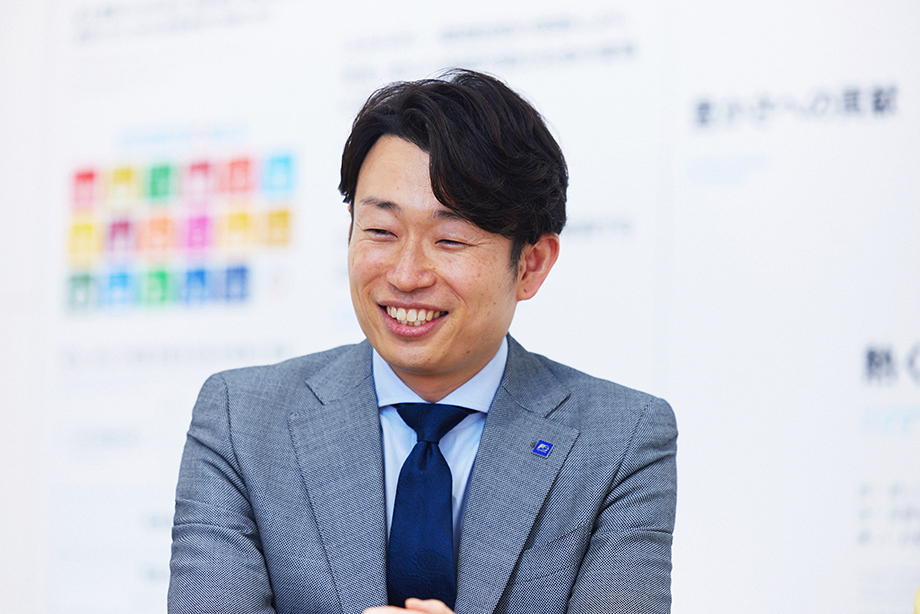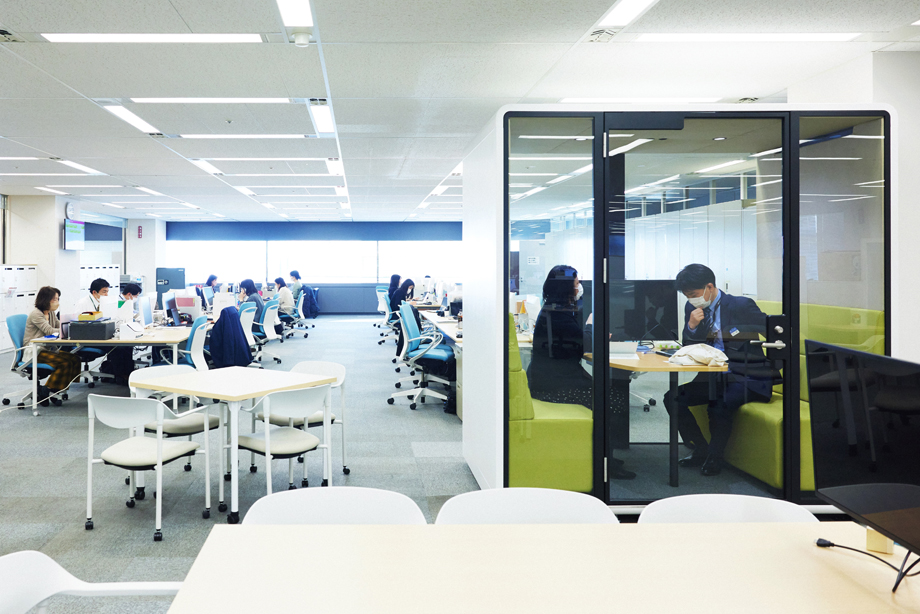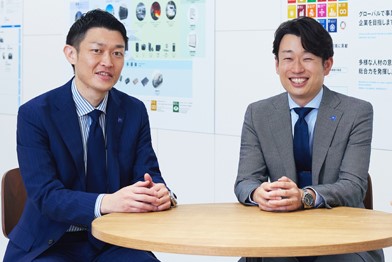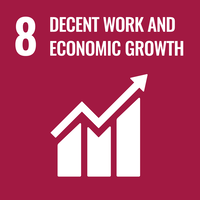Sustainability
Work Style Reform | Our Contribution Activities to SDGs
Promoting Work Style Reform to “Creating a Virtuous Cycle of Well-being and Sustainable Company Growth”
Updated February 2023. The affiliation and job descriptions mentioned are those at the time of the interviews.
Updated April 2025. Some parts of the article have been revised.
Fuji Electric is promoting work style reform aimed at increasing profits through productivity growth and re-energizing employees by enhancing the work-life balance. We heard from employees regarding the work style reform activities put in place to "creating a virtuous cycle of well-being and sustainable company growth", which is the vision of our human resources strategy.
Creating a virtuous cycle of well-being and sustainable company growth

As the values of workers evolve and the impact of the COVID-19 pandemic continues, work style needs are becoming increasingly diverse. It can be said that improving productivity through work style reforms is an essential initiative for corporate management in the future.
Fuji Electric started reforming work styles in 2008 to achieve a work-life balance and, since the 2017 fiscal year, the company has accelerated this initiative to reduce overtime hours, encourage employees to take leave and enhance various other systems that lead to work style reform. The purpose is to increase profits through productivity growth and to re-energize employees by enhancing the work-life balance through the realization of varied paces of work and flexible and diverse work styles. Kei Hirose of the Human Resources Department shares his thoughts on the initiative.
“Fuji Electric’s work style reform is intended for creating a virtuous cycle of well-being and sustainable company growth. We as the human resources department are working to ensure that our employees feel happy working and are able to work independently and productively.”
Flexibility in choosing where you work
The Flexible Location Work System epitomizes Fuji Electric’s work style reform efforts. This system enables flexible options for where employees work. By allowing employees to work in satellite spaces set up at each office, not to mention from home, we can help employees with personal responsibilities such as child care and nursing care to balance their responsibilities, as well as reduce the burden of commuting. When the system was first introduced in 2017, the work style was new and unfamiliar, and only employees with child care and nursing care needs were eligible, but in response to the increasing needs of employees and the trend toward work style reform, the number of eligible employees and the number of days provided were gradually expanded.
“We have received positive feedback from employees who say that they are now able to use their time more flexibly, and that they are able to spend more time with their family thanks to the reduction in commuting time. In a survey conducted in 2022, more than 50% of employees who used the system responded that they were motivated by greater discretion in how they work and that the system contributed to improving work efficiency. There is also data showing that it has led to a reduction in overtime. There is no doubt that the system contributes to a more productive way of working. We believe this system will become increasingly necessary in the future in order to enhance the appeal of the company through the realization of diverse ways of working, improve productivity, and continue operations in times of emergency, and we intend to develop it into a system that's easier to use according to employee needs,” Hirose says.
Free addressing making workplaces more comfortable and productive
Efforts to create a work environment suitable for new ways of working are also underway. Free addressing of offices is a case in point. In recent years, Fuji Electric has seen significant changes in work styles, with telecommuting becoming the norm and online meetings becoming commonplace. However, the work environment has remained unchanged for a long time. With the aim of creating a work environment that is comfortable to work in and highly productive according to the way each employee works, free address seating has been adopted for all desks. All personal desks and side cabinets, which were heavily stocked with documents, were removed. The number of seats was reduced by a set amount under the assumption that employees would be working remotely, and in the space created as a result, meeting tables and Internet booths, which were highly requested, were installed. The promotion of paperless operations in parallel with free addressing is the heart of the initiative.

“There was a big obstacle to promoting free addressing. There was reluctance and anxiety among employees. I think they felt a strong reluctance to lose their seats and anxiety about a potential lack of communication with superiors, subordinates and colleagues.”
A staff of the General Affairs Department says that one challenge was a “vague sense of anxiety” among employees. Once the step was taken, however, the benefits turned out to be huge. With the “invisible walls” between departments gone, communication was stimulated. Information exchange began to cross departmental boundaries, she says. The office became clean and bright, which also fostered a motivation to keep it that way. Going paperless has led to a shift in attitudes toward document storage, which has led to the strengthening of information security, business continuity planning (BCP) and knowledge management.
“The benefits of free address seating were greater than I had imagined. I think it helped dispel the preconceptions and anxieties that each of us had and gave us a chance to ‘break out of our skin.’ There is no doubt that this was a major step toward further reform and productivity improvement.”
A stir made to push work style reform

No matter how much we are told to be more productive, it is not easy to change people’s behavior. In order to encourage individual employees to change their attitudes, it is necessary to present clear benefits. Accordingly, Fuji Electric introduced incentives for employees who work in highly time-valued ways. Under this scheme, employees with planning jobs who worked less than 10 hours overtime per month on average annually and received excellent results in evaluations of performance targets and behavioral characteristics will receive an additional incentive of 500,000 yen to 700,000 yen along with their bonus. Norihito Ochiai of the Human Resources Department explains the reactions to this system.
“We have received comments from employees who say they have always tried to work efficiently and produce results and that they are happy to be recognized for their efforts, as well as employees who say that the program provided an opportunity to think about how to proceed with their tasks.”
The message of the company has become clearer, and the motivation of employees who are provided with the incentive has increased. Clearly, it has acted as a catalyst for further progress in work style reform at Fuji Electric. Meanwhile, Ochiai stresses that more needs to be done.
“This is a symbolic measure that carries the company’s message, and I believe it has created a stir toward the improvement of productivity of indirect employees, which has been a topic of discussion for many years. I urge all eligible employees to continue to pursue productive ways of working with the aim of earning incentives. On the other hand, in order to further reform the way we work, I believe it is necessary to take measures that will lead to a change in the attitudes of all employees by expanding the scope to include manufacturing shop floors. Work style reform should not stop there. I would like for it to continue to evolve as an initiative that leads to corporate prosperity and employee happiness.”
The challenge has no goal

There is no “ultimate” goal in work style reform. It is essential to improve from small things with the aim of creating a more productive and comfortable working environment while constantly reviewing the way individuals work.
“We will ensure that our employees feel happy working and are able to work independently and productively, thereby creating a virtuous cycle of well-being and sustainable company growth. Fuji Electric will continue to take on such challenges. To this end, it is necessary to listen closely to the needs of each and every employee and formulate more useful messages. We want to create an environment where employees at each workplace feel happy to work at Fuji Electric,” says Hirose.
Contribution to SDGs


As stated in our Management Policy, we intend to “maximize our strengths as a team, respecting employees’ diverse ambition.” We embrace the diversity of each and every employee and are actively working to create a system, corporate culture and environment that empower employees to the fullest. This also contributes to our target for the SDGs “5. Achieve gender equality and empower all women and girls” and “8. Decent work and economic growth.”
